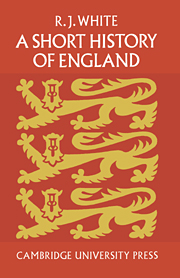Book contents
- Frontmatter
- Preface
- Contents
- Introduction: On the Character of English History
- 1 Roman Britain
- 2 Saxon England
- 3 The Anglo-Norman State
- 4 Common Law and Charter
- 5 The High Middle Ages
- 6 The Nation-State
- 7 The first Elizabethan Age
- 8 The Civil War
- 9 The Withdrawing Roar
- 10 The Century of Success
- 11 The first British Empire
- 12 The Age of Everything
- 13 War and Peace
- 14 Victorian Ages
- 15 Imperial and Edwardian
- Postscript
- Further Reading
- Index
- Frontmatter
- Preface
- Contents
- Introduction: On the Character of English History
- 1 Roman Britain
- 2 Saxon England
- 3 The Anglo-Norman State
- 4 Common Law and Charter
- 5 The High Middle Ages
- 6 The Nation-State
- 7 The first Elizabethan Age
- 8 The Civil War
- 9 The Withdrawing Roar
- 10 The Century of Success
- 11 The first British Empire
- 12 The Age of Everything
- 13 War and Peace
- 14 Victorian Ages
- 15 Imperial and Edwardian
- Postscript
- Further Reading
- Index
Summary
The term Victorian was coined in the year 1851, the year of the Great Exhibition, but Victorianism existed long before and was by no means confined to the Queen's dominions. Much that we now identify as essentially Victorian may be discovered at Windsor Castle in the reign of the Queen's grandfather, where the King presided as a paragon of domestic virtue, and no less clearly on the confines of Clapham Common where dwelt the Evangelical families of the ‘Sect’. In 1787 William Wilberforce, the most celebrated of the Claphamites, induced the King to issue a royal proclamation condemning vice (or, at any rate, as Sydney Smith said, vice among persons with incomes under £500 per annum) and founded a Vigilance Committee. Many believed the access of propriety among the well-to-do as the old King's reign went on was a consequence of the French Revolution, for, as Lady Bracknell said, ‘we all know what that led to’. Bowdler's Family Shakespeare appeared in 1818, and a strong moralistic tide is to be detected beneath the glittering surface of Regency England. A certain air of stuffiness, smugness, prudery, philistinism, not to mention humbug, still afflicts our nostrils at the mention of the word ‘Victorian’ despite the endeavours of recent historians to dispel it. It proceeds from any part of Europe where middle-class comfort prevailed, from the Germany of Buddenbrooks and the France of Stendhal and Balzac as strongly as the England of the Prince Consort.
- Type
- Chapter
- Information
- A Short History of England , pp. 248 - 263Publisher: Cambridge University PressPrint publication year: 1967



